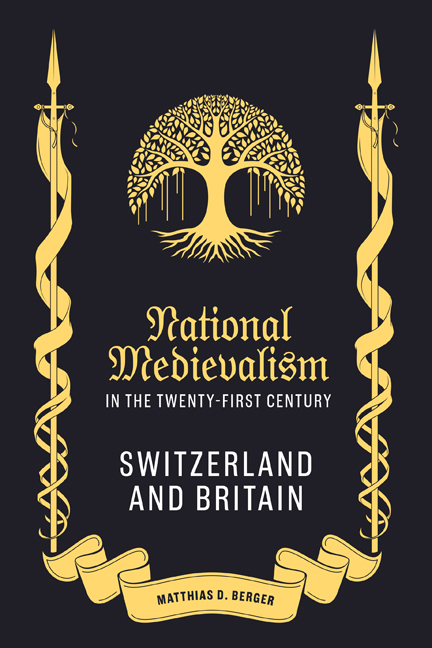Book contents
- Frontmatter
- Dedication
- Contents
- List of Illustrations
- Acknowledgements
- Author’s Note
- List of Abbreviations
- Introduction
- 1 Constructing Continuity: Four Nations Imagine Their Beginnings
- Part I The Politics of Autochthony
- 2 For Freedom Alone: The Scottish Independence Referendum
- 3 2016 and All That: Brexit
- 4 Freiheit statt Vögte: The Swiss National-Conservatives
- Part II The Others of National Medievalism
- 5 Masculine Middle Ages: Gender
- 6 In Strange Lands: Race, Ethnicity, Immigration
- Conclusion: The Demands of the Past
- Afterword: National Medievalism in the Age of COVID-19
- Bibliography
- Index
- Medievalism
5 - Masculine Middle Ages: Gender
Published online by Cambridge University Press: 17 December 2023
- Frontmatter
- Dedication
- Contents
- List of Illustrations
- Acknowledgements
- Author’s Note
- List of Abbreviations
- Introduction
- 1 Constructing Continuity: Four Nations Imagine Their Beginnings
- Part I The Politics of Autochthony
- 2 For Freedom Alone: The Scottish Independence Referendum
- 3 2016 and All That: Brexit
- 4 Freiheit statt Vögte: The Swiss National-Conservatives
- Part II The Others of National Medievalism
- 5 Masculine Middle Ages: Gender
- 6 In Strange Lands: Race, Ethnicity, Immigration
- Conclusion: The Demands of the Past
- Afterword: National Medievalism in the Age of COVID-19
- Bibliography
- Index
- Medievalism
Summary
‘One people will we be – a band of brothers – no danger, no distress shall sunder us.’ ‘Ahem, hello? And the women?’ ‘Okay, okay, okay, brothers and sisters.’
IN CONTRAST TO some of the cases of racial, ethnic and immigrant othering which I discuss in the next chapter, national ideology does not usually other along gender lines to the point of outright exclusion. By this I mean that in medievalism women are not denied symbolic membership of the national body. As is widely accepted of medievalism more generally, however, women are rarely central figures in British and Swiss medievalism but, rather, are mostly restricted to traditionally ‘feminine’ and familial roles (mother, daughter, wife) that tend to provide only limited female agency. Some of the examples discussed here highlight the traditional men's roles of warrior and wielder of influence, whereas others show that there is, in the early twenty-first century, a sustained interest in female perspectives in the context of medievalist identity narratives.
Before I turn to national medievalism specifically, a word on gender and medievalism more generally. As Lauryn Mayer remarks, the modern Middle Ages are ‘a world of men’: women ‘are allowed, of course, but their presence usually only serves to reinforce the values of the patriarchy’. In medievalism, they tend to be portrayed as powerless and passive and hence either invite male protection or risk male predation. These two responses are, in Mayer's account, the ‘benevolent’ and ‘hostile’ sides of the same sexist coin: ‘chivalry and violence towards women both operate under the assumption of feminine inferiority’.
Variations on the theme of inferiority are reflected in a set of female stock characters. Mayer identifies some of them: ‘downtrodden female villagers (usually victims of starvation, rape, or both), […] professional prostitutes, tavern wenches, or camp followers, or decorative symbols of female privilege’. Motherhood also looms large. Inferiority is not an issue here in the strict sense, but a disregard for the female individual is: many medievalisms are interested far less in the mother's experience than in her ability to produce heirs (especially male ones).
- Type
- Chapter
- Information
- National Medievalism in the Twenty-First CenturySwitzerland and Britain, pp. 143 - 171Publisher: Boydell & BrewerPrint publication year: 2023

